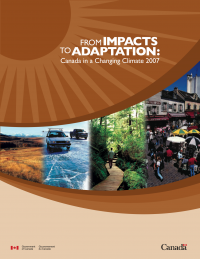We must be close to a turning point in investing in the environment, because the budget tabled today couldn't do much less.
A token $25 million for the next four years allocated to renewable energy in the forestry sector shows that this government sees renewable energy technologies as "boutique" experiments, not the mainstream solutions that they are in other parts of the world — and, more importantly, what they need to be in Canada.
If the government is going to live up to its election promise of generating 90 per cent of its electricity from sources that don't produce greenhouse gas pollution by 2020, we will need a ten-fold increase in renewable power in the next 10 years. Currently, 77 per cent of our electricity comes from "non-emitting sources" (defined by the government as large hydro, nuclear, carbon capture and storage and renewables) — but to close that gap on a national scale will require a serious ramp-up of investment in renewable power. New nuclear or carbon capture and storage cannot be rolled out in a meaningful way in only 10 years, in spite of the $1.5 billion allocated to them in the last two years.
 In China, 1.12 million people work in the renewable energy industry, and more than 100,000 new jobs are added to this sector every year, according to the government-backed Chinese Renewable Energy Industries Association.
In China, 1.12 million people work in the renewable energy industry, and more than 100,000 new jobs are added to this sector every year, according to the government-backed Chinese Renewable Energy Industries Association.
Yesterday's Speech from the Throne committed Canada to becoming a "leader in green job creation", but today's budget does not walk the talk. With the Federal renewable energy investment program officially out of money, this budget's void effectively means the federal government is walking away from renewable power. Despite studies that have shown investments in renewable power actually generate a net financial gain for the government through increased tax revenues, it appears that the government still believes that taking action to protect the environment is at odds with building a strong economy. (In fact, Pembina's analysis shows that we can take strong action to address climate change while growing our economy and creating nearly two million net new jobs.)
Perhaps that perception is in part why Canada ranked 14th out of 17 countries for innovation, according to a recent report card from the Conference Board of Canada. Without strong federal leadership, Canadians will continue to lag behind as other countries take the lead in the emerging clean-energy market. (The U.S., for instance, set aside $98 billion for environmental and sustainable energy projects in last year's economic stimulus package, outspending Canada 14:1.)
While there was a notable ($80 million) investment to top up Canada's home energy efficiency program for one more year, the suite of ecoEnergyprograms that help Canadian homeowners, businesses and industries invest in renewable energy solutions will come to an abrupt end by the end of the next fiscal year. This budget suggests it will review some efficiency programs, but there is an inevitable gap between when these programs will run out of money and when some, if any, will be renewed or revamped.
 On top of doing little for renewable energy or energy efficiency at home, this federal budget also does not live up to this government's commitment under the Copenhagen Accord to provide money to help developing countries tackle climate change and adapt to its impacts. Canada's fair share of the short-term financing agreed to in the Copenhagen Accord would amount to over $300 million dollars a year for the next three years. Instead, today's budget provided nothing.
On top of doing little for renewable energy or energy efficiency at home, this federal budget also does not live up to this government's commitment under the Copenhagen Accord to provide money to help developing countries tackle climate change and adapt to its impacts. Canada's fair share of the short-term financing agreed to in the Copenhagen Accord would amount to over $300 million dollars a year for the next three years. Instead, today's budget provided nothing.
One opportunity that presents itself to not only reduce environmental damage, but also reduce our deficit, would be to finally put a price on carbon pollution. But this government has clearly signaled it is waiting for the Americans to write that policy for us.
The throne speech praised the government's 2009 stimulus spending for insulating Canadians from the pain of the global economic crisis "without unduly burdening future generations" - yet Prime Minister Harper's refusal to take strong and decisive action to prevent the irreversible impacts of climate change places the financial and ecological burden of those impacts squarely on the shoulders of future generations.
The good news is, we can only improve from here.





